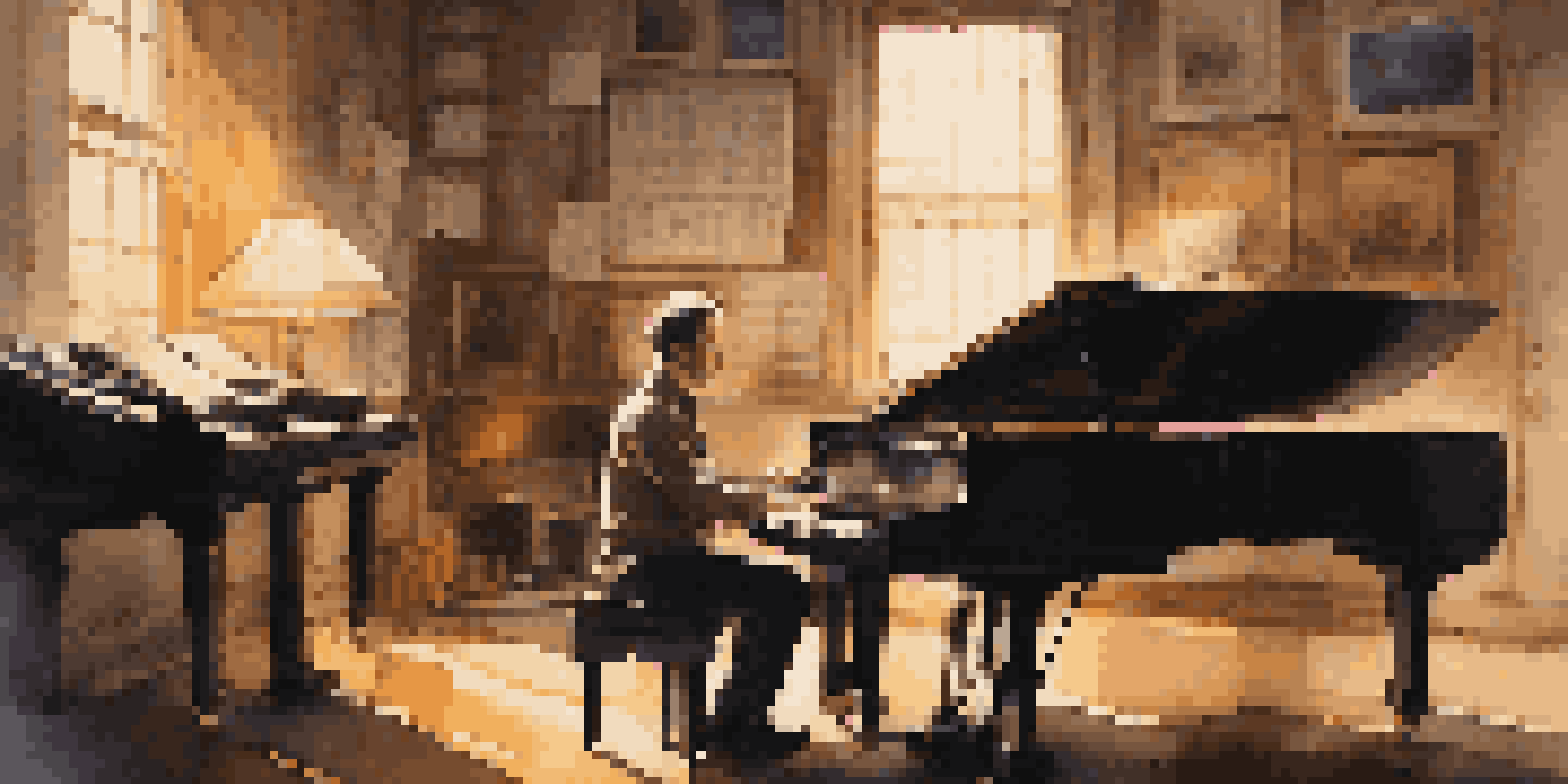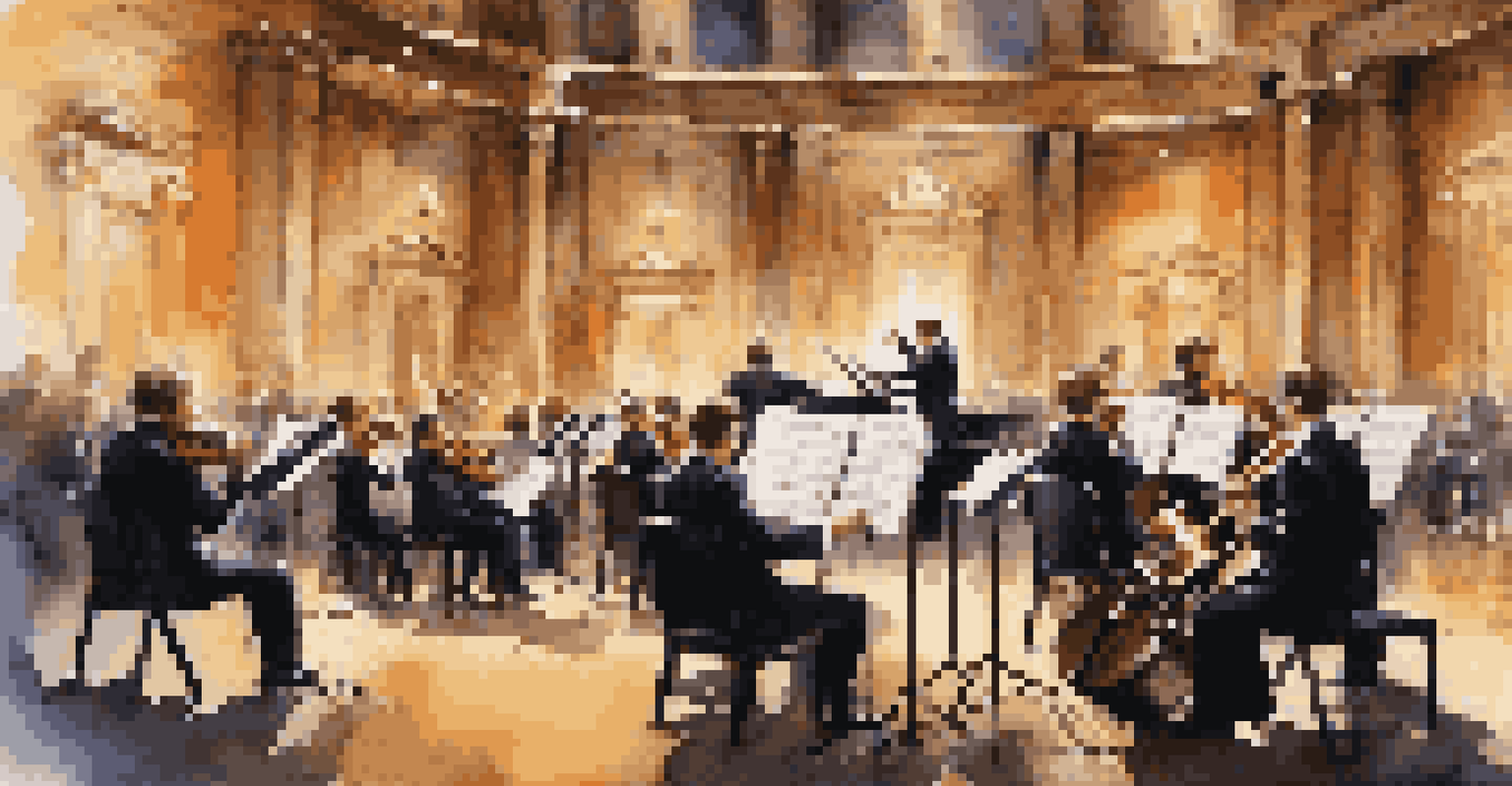The Art of Creating Music for Video Games and Film

Understanding the Role of Music in Storytelling
Music is a powerful tool that enhances storytelling in both video games and films. It sets the mood, builds tension, and evokes emotions, guiding the audience’s experience. Imagine a suspenseful moment in a film; the music swells, creating a palpable sense of anticipation.
Music is the shorthand of emotion.
In video games, music plays an equally critical role. It not only supports the narrative but also reacts to player actions, creating an immersive environment. For instance, as a player approaches a boss battle, the music shifts to a more intense score, signaling the challenge ahead.
This integration of music into storytelling is what makes the experience memorable. When done right, the music becomes a character in itself, influencing how we feel about the story unfolding on screen or in gameplay.
Collaborating with Directors and Game Developers
Collaboration is key when creating music for visual media. Composers often work closely with directors and game developers to ensure the music aligns with their vision. This relationship allows composers to understand the emotional beats and thematic elements that need to be highlighted.

During the initial stages, discussions about the project's tone and style are crucial. This may involve watching early cuts of the film or beta versions of a game, allowing composers to tailor their music accordingly. Think of it as a dance where both parties must be in sync to create a harmonious final product.
Music Enhances Storytelling
Music sets the mood and evokes emotions, making the storytelling experience in films and video games more immersive.
The iterative process of feedback and revisions further refines the music. As ideas are exchanged, composers may need to pivot their compositions based on the evolving needs of the project, ensuring that the final score resonates with both the creators and the audience.
Creating Themes and Motifs for Characters
One of the most effective techniques in composing for media is developing themes and motifs for characters. These musical phrases can serve as a signature for specific characters, helping audiences connect with them on a deeper level. For example, think of how John Williams uses distinct themes for characters like Darth Vader or Harry Potter.
Without music, life would be a mistake.
In video games, this concept is equally powerful. A character's theme can evolve throughout the game, reflecting their journey and development. As players progress, they might hear variations of a theme that signify growth or change, enhancing emotional engagement.
By weaving these themes throughout the narrative, composers create a rich tapestry of sound that reinforces character arcs. This technique not only makes the music memorable but also enriches the overall storytelling experience.
Incorporating Sound Design and Effects
Music is just one piece of the puzzle; sound design plays a crucial role in the overall audio landscape of video games and films. Effective sound design complements the music, adding layers of realism and immersion. For instance, the sound of footsteps, explosions, or environmental sounds can enhance the emotional impact of a scene.
In video games, sound effects are often triggered by player actions, creating a dynamic audio experience. Imagine the excitement of a victory sound after completing a challenging level; it’s the perfect blend of music and sound design that heightens the moment.
Collaboration is Key
Composers work closely with directors and game developers to ensure the music aligns with the project's vision and emotional beats.
By collaborating with sound designers, composers can create a cohesive audio experience that draws the audience into the world. Together, they craft an environment where music and sound effects work in harmony, enriching the overall narrative.
Choosing the Right Instruments and Technology
The choice of instruments and technology can drastically affect the sound of the final score. Depending on the mood and style of the project, a composer might opt for a full orchestra, electronic sounds, or even unconventional instruments. This diversity allows for a unique sonic palette that can set a project apart.
For example, a horror film might benefit from eerie string instruments and unsettling electronic textures, while an epic adventure might call for sweeping orchestral arrangements. Understanding how different instruments evoke specific emotions is essential for composers.
In the realm of video games, technology plays a significant role in how music is experienced. Composers often explore interactive music systems that adapt based on gameplay, ensuring a seamless integration of music that responds to the player’s journey.
Testing and Iterating on Musical Ideas
The process of composing music for film and video games is often an iterative one. Composers create multiple versions of a piece, testing various arrangements, instrumentation, and styles to see what resonates best. This experimentation allows for innovation and creativity to flourish.
Feedback from directors and developers is invaluable during this phase. They can provide insights on what works and what doesn’t, guiding composers toward a final product that aligns with the project’s vision. This back-and-forth is essential in refining the score.
Iterative Composition Process
The iterative process of testing and refining musical ideas leads to impactful scores that resonate with audiences.
Ultimately, this iterative process leads to a polished and impactful musical experience. It’s a journey of discovery where composers can push boundaries and explore new musical landscapes while remaining true to the project’s emotional core.
The Impact of Music on Audience Experience
The impact of music on audience experience cannot be overstated. Well-crafted scores can evoke powerful emotions, from joy to sadness, fear to excitement. A great example is how a well-timed musical cue can amplify a moment of triumph or deepen the sense of loss.
In video games, music enhances player engagement, driving them to feel more connected to the story and characters. As players immerse themselves in the game world, the music can motivate them to overcome challenges, creating a more rewarding experience.

Ultimately, the right score can linger in the minds of audiences long after the credits roll. It shapes memories and experiences, making music an integral part of film and video game storytelling.